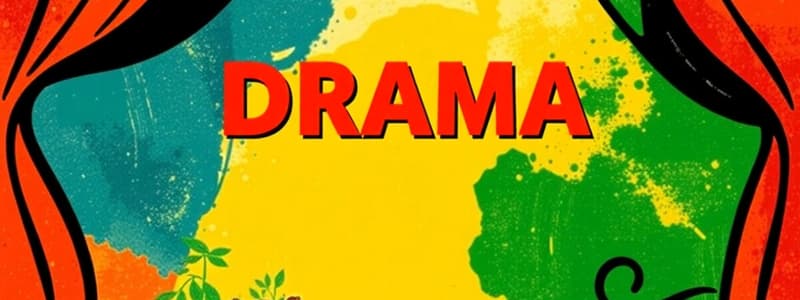Podcast
Questions and Answers
What role does setting play in a drama?
What role does setting play in a drama?
- It establishes the time and place of the story. (correct)
- It dictates the resolution of the plot.
- It introduces the central conflict.
- It determines the protagonist's motivations.
Which statement best describes themes in drama?
Which statement best describes themes in drama?
- They are secondary elements that add detail.
- They focus on specific characters' backgrounds.
- They are overarching ideas or messages conveyed by the playwright. (correct)
- They solely represent conflict resolution.
What type of conflict is primarily internal?
What type of conflict is primarily internal?
- A character grappling with a moral dilemma. (correct)
- A struggle against societal norms.
- A feud between two rival families.
- A confrontation with nature during a storm.
How does symbolism enhance a drama?
How does symbolism enhance a drama?
What purpose does foreshadowing serve in a play?
What purpose does foreshadowing serve in a play?
What is the significance of tension in a drama?
What is the significance of tension in a drama?
Which of the following best represents mood in a drama?
Which of the following best represents mood in a drama?
What is typically associated with the climax of a story?
What is typically associated with the climax of a story?
What is the origin of the word 'drama'?
What is the origin of the word 'drama'?
Which of the following elements is NOT part of the plot structure in a drama?
Which of the following elements is NOT part of the plot structure in a drama?
In drama, characters can be categorized into several types. Which type is NOT typically mentioned?
In drama, characters can be categorized into several types. Which type is NOT typically mentioned?
What primary function does dialogue serve in drama?
What primary function does dialogue serve in drama?
What distinguishes drama from other forms of literature?
What distinguishes drama from other forms of literature?
Which of the following is NOT true about characterization in drama?
Which of the following is NOT true about characterization in drama?
What comprises the rising action in a dramatic plot?
What comprises the rising action in a dramatic plot?
Which element is NOT essential in the storytelling of drama?
Which element is NOT essential in the storytelling of drama?
Flashcards
Drama
Drama
A form of visual literature that tells a story using characters, plot, and setting.
Plot
Plot
The sequence of events in a story, including introduction, rising action, climax, falling action, and resolution.
Characters
Characters
The people (or sometimes creatures) in a drama, categorized by their roles: protagonist, antagonist, or supporting.
Dialogue
Dialogue
Signup and view all the flashcards
Setting
Setting
Signup and view all the flashcards
Theme
Theme
Signup and view all the flashcards
Conflict
Conflict
Signup and view all the flashcards
Symbolism
Symbolism
Signup and view all the flashcards
Foreshadowing
Foreshadowing
Signup and view all the flashcards
Tension & Climax
Tension & Climax
Signup and view all the flashcards
Mood & Tone
Mood & Tone
Signup and view all the flashcards
Study Notes
Creative Writing/Malikhaing Pagsulat Grade 12, Quarter 1, Module 1
- This is a creative writing module for Grade 12
- The module appears to focus on the nature of drama
Lesson 1: The Nature of Drama
- Drama originates from the Greek word "Dran," meaning "to do" or "to act"
- Drama is a visual form of literature
- It employs all the essential elements of storytelling, including plot, setting, characters, and a problem to solve
- The written words of a play are distinct from the actual performance
- The written words are the drama, while the presentation is the event
Important Elements of Drama
- Plot: The sequence of events in the story, including introduction, rising action, climax, falling action, and resolution
- Characters: The protagonists, antagonists, and supporting figures in the play
- Dialogue: The communication between characters, expressing thoughts, feelings, and intentions
- Setting: The time and place of the play, encompassing the physical, social, cultural, and historical context
- Theme: Overarching ideas or messages conveyed by the playwright, exploring universal truths, societal issues, or moral dilemmas
- Conflict: Internal or external struggles that drive the plot forward, creating tension
- Symbolism: The use of objects, actions, or words to represent abstract ideas or concepts, adding layers of meaning
- Foreshadowing: A literary device hinting at future events to build anticipation and keep the audience engaged
- Tension and Climax: The buildup of suspense and conflict throughout the play, leading to the climax—the point of greatest intensity and turning point in the story
- Mood and Tone: Mood refers to the overall emotional atmosphere, while tone is the author's attitude toward the subject matter
Studying That Suits You
Use AI to generate personalized quizzes and flashcards to suit your learning preferences.



